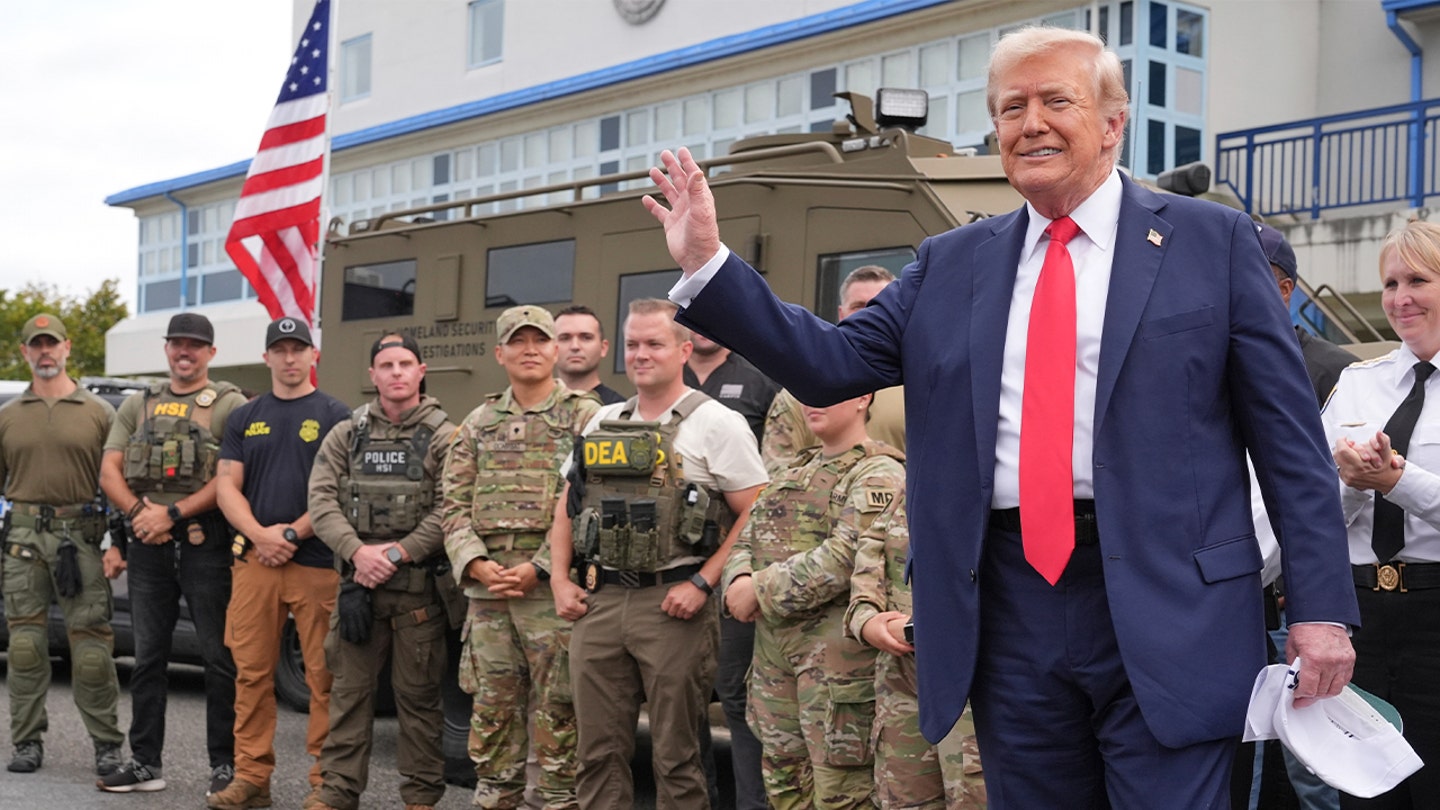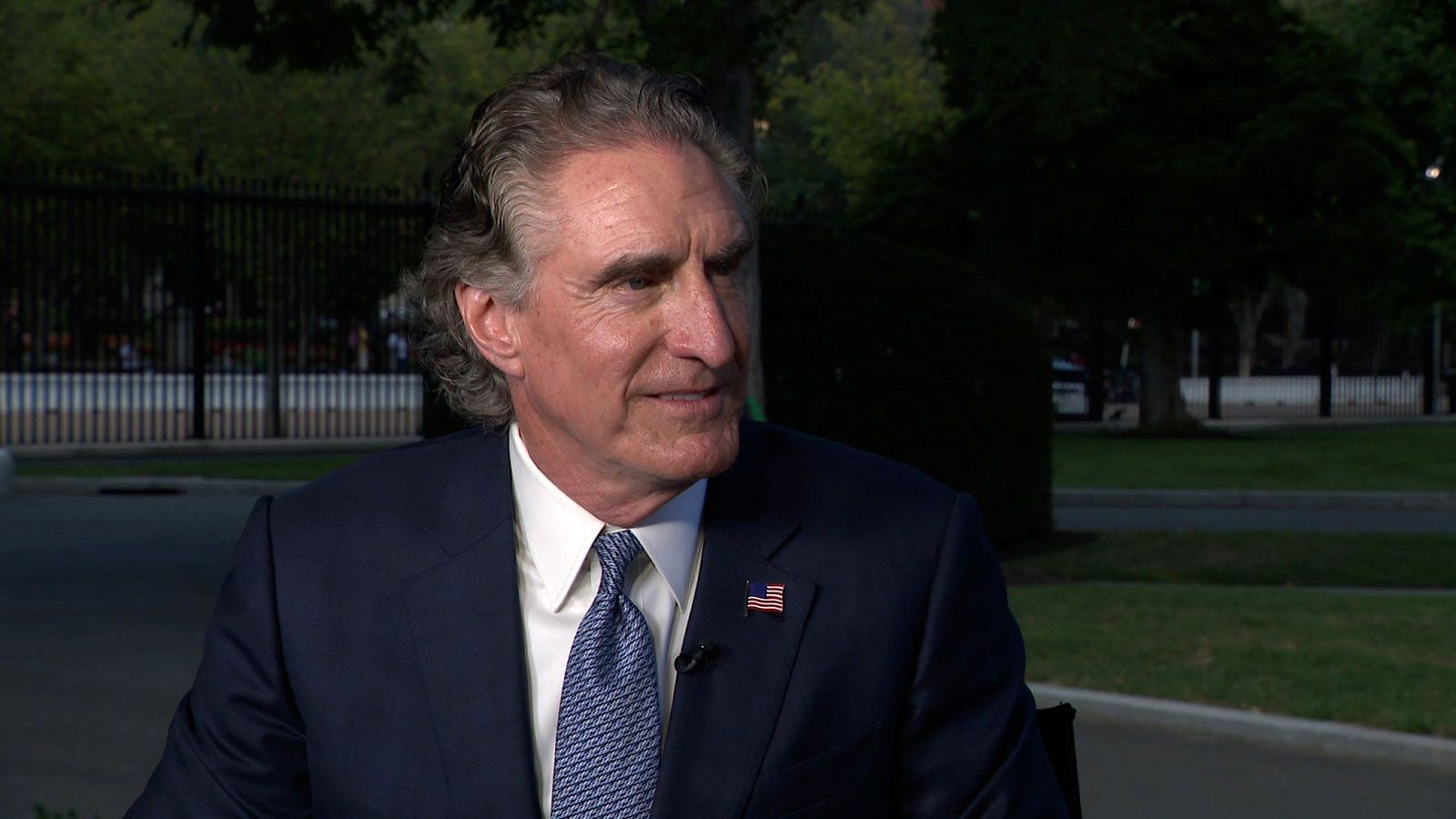
Kamala Harris fundraising events have been a flop to help raise money for DNC: Report
Entities mentioned:
- Kamala Harris: Ambition, Power, Legacy
- Democratic National Committee (DNC): Self-preservation, Unity, Influence
- Donald Trump: Power, Competitive spirit, Ambition
- Jen O'Malley Dillon: Loyalty, Professional pride, Duty
- Ken Martin: Duty, Obligation, Professional pride
Article Assessment:
Credibility Score: 65/100
Bias Rating: 55/100 (Center)
Sentiment Score: 30/100
Authoritarianism Risk: 20/100 (Strongly Democratic)
Bias Analysis:
The article presents information from multiple sources, including both Harris' allies and critics. While it leans slightly towards criticism of Harris and the DNC, it also includes defensive statements, maintaining a relatively balanced perspective.
Key metric: Political Fundraising Effectiveness
As a social scientist, I analyze that this article highlights significant challenges in the Democratic Party's fundraising efforts, particularly those associated with former Vice President Kamala Harris. The reported disappointing results from Harris' fundraising events, coupled with the DNC's ongoing payments of her campaign debts, suggest a strain on the party's financial resources. This situation could potentially impact the Democrats' ability to compete effectively in future elections, especially the upcoming midterms. The article also reveals internal tensions within the party, with some members expressing frustration over campaign spending and others criticizing the current DNC leadership. These factors combined indicate a period of financial and strategic difficulty for the Democratic Party, which could have broader implications for their political influence and electoral prospects.

81% of Americans see crime as a 'major problem' in big cities, new poll shows
Entities mentioned:
- Donald Trump: Power, Control, Recognition
- American Public: Security, Fear, Justice
- Pam Bondi: Duty, Professional pride, Control
- Iris Tao: Security, Self-preservation, Recognition
- Anna Giaritelli: Justice, Security, Moral outrage
- Gregg Pemberton: Professional pride, Security, Control
Article Assessment:
Credibility Score: 65/100
Bias Rating: 75/100 (Lean Right)
Sentiment Score: 30/100
Authoritarianism Risk: 70/100 (Authoritarian Tendencies)
Bias Analysis:
The article leans right, evidenced by its focus on Trump's actions and positive framing of his crime policies. It predominantly features perspectives supporting Trump's approach, with limited counterbalancing views.
Key metric: Crime Rate
As a social scientist, I analyze that this article highlights a significant public concern over crime rates in major US cities, with a strong emphasis on the Trump administration's approach to law enforcement. The poll data suggests widespread anxiety about crime across political affiliations, though with varying levels of support for Trump's methods. The personal anecdotes and support from law enforcement officials reinforce the narrative of a crime crisis, potentially influencing public perception and policy decisions. The federalization of local police forces represents a significant shift in crime-fighting strategy, which could have far-reaching implications for federal-state relations and civil liberties.

Keegan Bradley 'deeply honored' Trump wanted him to play in Ryder Cup; hits back at Rory McIlroy's comments
Entities mentioned:
- Keegan Bradley: Professional pride, Duty, Loyalty
- Donald Trump: Influence, Recognition, Power
- Rory McIlroy: Competitive spirit, Professional pride, Skepticism
- Team USA: Competitive spirit, Pride, Unity
Article Assessment:
Credibility Score: 75/100
Bias Rating: 55/100 (Center)
Sentiment Score: 60/100
Authoritarianism Risk: 30/100 (Generally Democratic)
Bias Analysis:
The article presents multiple viewpoints and quotes directly from the involved parties, maintaining a relatively balanced approach. However, the inclusion of Trump's involvement and the focus on U.S. perspectives slightly tilts the narrative, though not significantly enough to be considered partisan.
Key metric: International Sports Diplomacy
As a social scientist, I analyze that this article highlights the intersection of sports and politics, particularly in the context of international competition. The involvement of a former U.S. President in team selection discussions for the Ryder Cup demonstrates the high-profile nature of this event and its potential impact on national pride and international relations. Bradley's decision to prioritize team performance over personal ambition, despite high-level encouragement, reflects a commitment to professional integrity and team dynamics. The disagreement between Bradley and McIlroy on the feasibility of a playing captain role underscores the evolving nature of sports leadership and the tensions that can arise in international competitions. This situation may influence perceptions of U.S. sports diplomacy and team cohesion on the global stage.

White House demands all Gaza hostages return home 'this week' amid stalled talks
Entities mentioned:
- Steve Witkoff: Duty, Determination, Influence
- Hamas: Power, Control, Self-preservation
- Israel: Security, Justice, Self-preservation
- Hostages and Missing Families Forum: Determination, Justice, Anxiety
- Benjamin Netanyahu: Power, Security, Self-preservation
- Donald Trump: Influence, Recognition, Ambition
Article Assessment:
Credibility Score: 75/100
Bias Rating: 55/100 (Center)
Sentiment Score: 35/100
Authoritarianism Risk: 40/100 (Generally Democratic)
Bias Analysis:
The article presents multiple viewpoints, including US, Israeli, and Hamas perspectives, as well as those of hostage families. While it leans slightly towards the US and Israeli positions, it also includes critical views of the Israeli government's approach.
Key metric: International Conflict Resolution Index
As a social scientist, I analyze that this article highlights the complex negotiations and tensions surrounding the hostage situation in Gaza. The involvement of multiple parties with diverging interests complicates the resolution process. The US, represented by Witkoff, is pushing for an immediate release of all hostages, while Hamas appears to be using the hostages as leverage. Israel's stance on complete destruction of Hamas creates an additional obstacle. The large-scale protests in Israel indicate growing public pressure on the government to prioritize hostage return over military objectives. This situation impacts the International Conflict Resolution Index by showcasing the challenges in balancing security concerns, humanitarian issues, and diplomatic negotiations in a long-standing conflict zone.

Trump, House GOP allies eye pathways to extend White House crime crackdown in DC
Entities mentioned:
- Donald Trump: Power, Control, Legacy
- House Republicans: Loyalty, Control, Security
- White House: Power, Control, Influence
- Rep. Andy Ogles: Security, Duty, Influence
- Rep. Anna Paulina Luna: Security, Control, Duty
- Rep. Andy Biggs: Security, Control, Influence
- Democrats: Righteousness, Freedom, Moral outrage
Article Assessment:
Credibility Score: 65/100
Bias Rating: 70/100 (Lean Right)
Sentiment Score: 55/100
Authoritarianism Risk: 75/100 (Authoritarian Tendencies)
Bias Analysis:
The article leans right, primarily quoting Republican sources and framing the issue from their perspective. While it mentions Democratic opposition, it doesn't provide equal space or depth to counter-arguments.
Key metric: Crime Rate in Washington D.C.
As a social scientist, I analyze that this article highlights a significant shift in the balance of power between federal and local government in Washington D.C. The proposed legislation aims to extend the President's authority over D.C.'s police force, potentially undermining local autonomy. This move could have far-reaching implications for federalism and urban governance in the U.S. The article suggests a decrease in homicides since federal intervention, but this claim requires further verification. The broader impact on crime rates, community-police relations, and local governance structures needs comprehensive study. This situation raises important questions about the limits of federal power, the rights of D.C. residents, and the potential precedent for federal intervention in other cities.

Trump Angry Not A Single Visiting European Leader Wearing Lederhosen, Tiny Hat
Entities mentioned:
- Donald Trump: Indignation, Control, Power
- Ursula von der Leyen: Duty, Unity, Obligation
- Volodymyr Zelensky: Determination, Justice, Unity
- Keir Starmer: Duty, Obligation, Professional pride
- European leaders: Unity, Duty, Obligation
Article Assessment:
Credibility Score: 30/100
Bias Rating: 30/100 (Lean Left)
Sentiment Score: 25/100
Authoritarianism Risk: 45/100 (Mixed/Neutral)
Bias Analysis:
The article leans left, evident in its satirical portrayal of Trump as culturally insensitive and dismissive of serious diplomatic matters. The framing mocks Trump's leadership style and understanding of international relations.
Key metric: International Relations and Diplomacy
As a social scientist, I analyze that this satirical article highlights the potential for cultural misunderstandings and stereotyping in international diplomacy. It portrays Trump as having a simplistic, caricatured view of European culture, which could negatively impact US-European relations. The article's absurd depiction of Trump's expectations for European leaders' attire serves to critique his approach to diplomacy and his perceived lack of cultural sensitivity. This satirical piece may reflect broader concerns about the state of US foreign policy and its potential effects on international cooperation, particularly in addressing serious issues like the Ukraine conflict.

‘Don’t negotiate, Linda’: Trump calls for $500 million Harvard settlement
Entities mentioned:
- Donald Trump: Power, Control, Revenge
- Harvard University: Self-preservation, Academic freedom, Professional pride
- Linda McMahon: Duty, Loyalty, Control
- Howard Lutnick: Competitive spirit, Loyalty, Power
- Allison Burroughs: Justice, Duty, Righteousness
- Alan Garber: Self-preservation, Professional pride, Duty
Article Assessment:
Credibility Score: 75/100
Bias Rating: 55/100 (Center)
Sentiment Score: 30/100
Authoritarianism Risk: 65/100 (Authoritarian Tendencies)
Bias Analysis:
The article presents multiple viewpoints and includes factual information from various sources. However, it gives more space to the administration's perspective and actions, slightly tilting the balance of presentation.
Key metric: Higher Education Federal Funding
As a social scientist, I analyze that this article highlights a significant conflict between the Trump administration and elite universities, particularly Harvard. The administration's aggressive stance, demanding large settlements and increased control over research patents, could have far-reaching implications for higher education funding and academic freedom. This approach appears to be driven by political motivations, leveraging public sentiment against elite institutions. The potential $500 million settlement and patent ownership changes could severely impact Harvard's operations and set a precedent for federal intervention in university affairs. This conflict represents a broader ideological battle over the role of government in higher education and the balance between oversight and institutional autonomy.

How an obscure housing director launched Trump’s firing of Fed governor Lisa Cook
Entities mentioned:
- Bill Pulte: Ambition, Power, Influence
- Donald Trump: Power, Control, Revenge
- Jerome Powell: Professional pride, Duty, Self-preservation
- Lisa Cook: Self-preservation, Professional pride, Indignation
- Justice Department: Duty, Obligation, Control
- Federal Reserve: Professional pride, Duty, Independence
Article Assessment:
Credibility Score: 75/100
Bias Rating: 45/100 (Center)
Sentiment Score: 35/100
Authoritarianism Risk: 65/100 (Authoritarian Tendencies)
Bias Analysis:
The article presents multiple viewpoints and includes critiques from both sides of the political spectrum. While it details Trump and Pulte's actions more extensively, it also includes their justifications and counterarguments from other parties.
Key metric: Federal Reserve Independence
As a social scientist, I analyze that this article highlights a significant challenge to the independence of the Federal Reserve, a crucial institution for U.S. economic stability. Bill Pulte's actions, seemingly endorsed by President Trump, represent an unprecedented level of political interference in Fed operations. The attempt to remove Governor Lisa Cook based on allegations from a housing official outside the Fed's purview suggests a breakdown in the traditional separation between political and monetary policy. This situation could potentially undermine public trust in the Fed's ability to make objective economic decisions, free from political pressure. The use of social media and public accusations to influence Fed personnel decisions also represents a departure from established norms, potentially setting a dangerous precedent for future administrations. The involvement of the Justice Department in investigating Fed officials based on referrals from a politically appointed housing director further blurs the lines between independent institutions and political agendas. This erosion of institutional boundaries could have long-term implications for the stability and credibility of U.S. economic policy-making.

Justice Department seeks to dismiss lawsuit filed by Proud Boys over January 6 prosecutions
Entities mentioned:
- Justice Department: Justice, Duty, Professional pride
- Proud Boys: Revenge, Self-preservation, Indignation
- Donald Trump: Loyalty, Power, Influence
- Joe Biden: Justice, Duty, Control
- Enrique Tarrio: Self-preservation, Recognition, Indignation
Article Assessment:
Credibility Score: 75/100
Bias Rating: 45/100 (Center)
Sentiment Score: 35/100
Authoritarianism Risk: 25/100 (Generally Democratic)
Bias Analysis:
The article presents multiple viewpoints, including those of the Justice Department, the Proud Boys, and Trump's perspective. While it leans slightly towards emphasizing the Justice Department's stance, it also provides context for the opposing arguments.
Key metric: Rule of Law Index
As a social scientist, I analyze that this article highlights the ongoing tension between political interests and the justice system in the aftermath of the January 6 Capitol attack. The Justice Department's move to dismiss the Proud Boys' lawsuit reinforces its commitment to upholding the rule of law, despite political pressure. This case underscores the challenges in maintaining an impartial justice system in a polarized political climate. The pardons issued by Trump and the subsequent lawsuit by the Proud Boys reveal the complex interplay between executive power, judicial processes, and far-right groups' attempts to reframe their actions. This situation may impact public perception of the justice system's integrity and the balance of powers in the U.S. government.

Burgum says Trump deploying National Guard to Democratic-led cities is not political: ‘He’s not targeting anything’
Entities mentioned:
- Doug Burgum: Loyalty, Duty, Professional pride
- Donald Trump: Control, Power, Influence
- Democratic Party: Self-preservation, Indignation, Justice
- Republican Party: Law and order, Control, Power
- JB Pritzker: Indignation, Self-preservation, Autonomy
- National Guard: Duty, Security, Control
Article Assessment:
Credibility Score: 65/100
Bias Rating: 55/100 (Center)
Sentiment Score: 35/100
Authoritarianism Risk: 65/100 (Authoritarian Tendencies)
Bias Analysis:
The article presents both Republican and Democratic viewpoints, but gives slightly more space to the administration's perspective. It includes some fact-checking of claims, indicating an attempt at balanced reporting.
Key metric: Violent Crime Rate
As a social scientist, I analyze that this article highlights the increasing politicization of law enforcement and public safety measures in the United States. The deployment of the National Guard to Democratic-led cities by a Republican president is framed as a non-partisan move to combat crime, but the underlying political tensions are evident. This action could potentially impact the violent crime rate, but the effectiveness is questionable given the complex nature of urban crime and the potential for increased tensions between federal and local authorities. The article also reveals a growing divide in perceptions of crime and appropriate responses between the two major political parties, which could have long-term implications for national unity and governance.